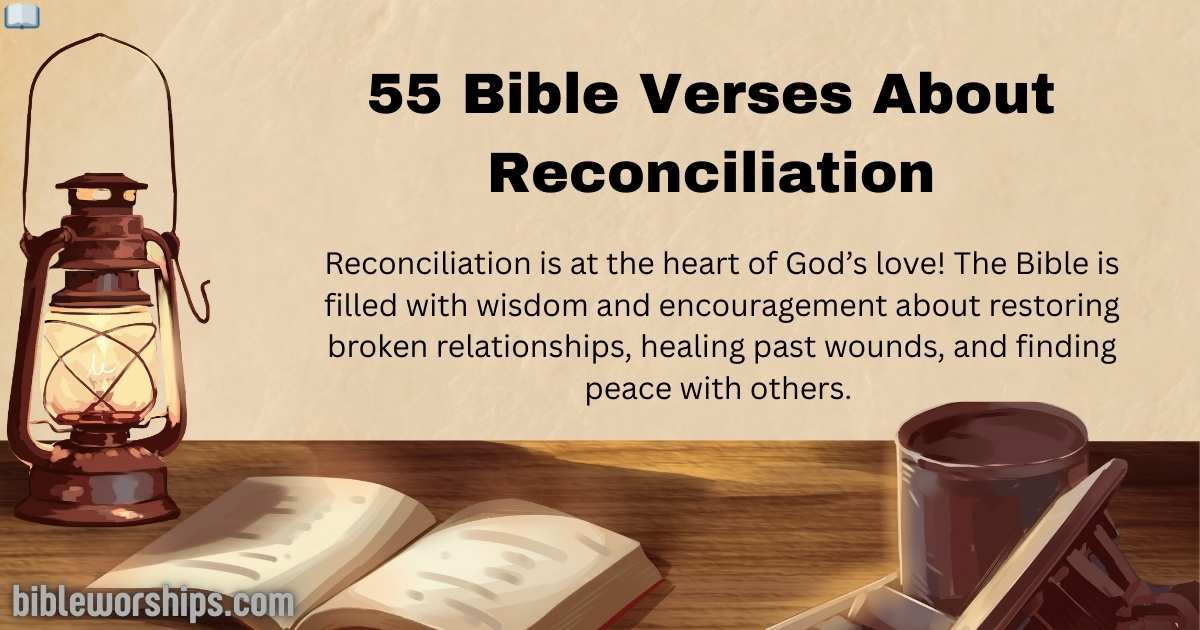Reconciliation is at the heart of God’s love! The Bible is filled with wisdom and encouragement about restoring broken relationships, healing past wounds, and finding peace with others. Bible Verses About Reconciliation remind us of God’s desire for unity—whether it’s mending friendships, strengthening families, or renewing our relationship with Him. Though the Bible may not use the word “reconciliation” in every verse, its teachings clearly emphasize forgiveness, grace, and restoration.
In this collection, you’ll find powerful scriptures that offer guidance on making peace, seeking forgiveness, and embracing God’s mercy. These verses will inspire you to let go of bitterness, extend love, and experience the joy of true reconciliation. As you read, may you be reminded of the life-changing power of God’s Word in bringing healing and hope to every relationship. Let’s explore these meaningful passages together!
1. Reconciliation with God through Christ
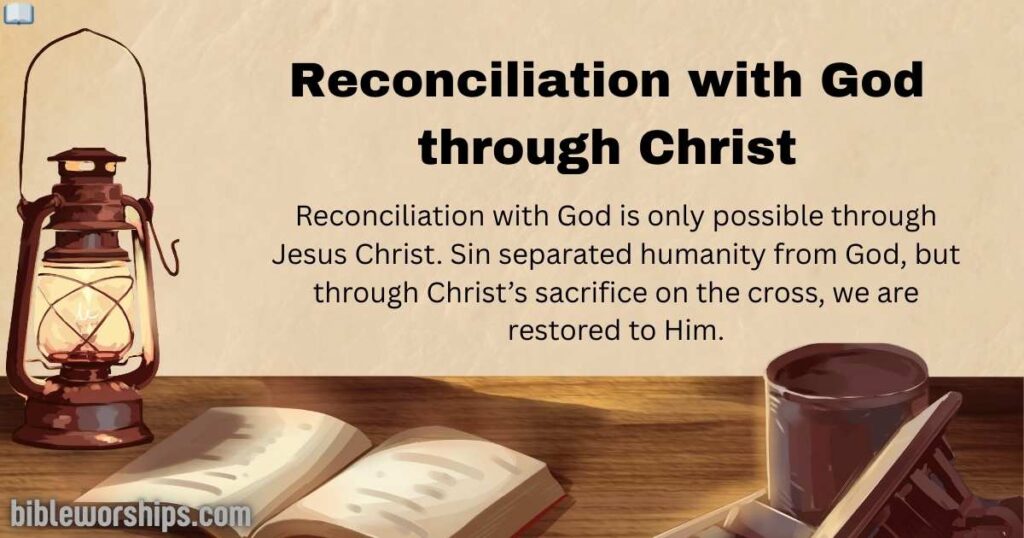
Reconciliation with God is only possible through Jesus Christ. Sin separated humanity from God, but through Christ’s sacrifice on the cross, we are restored to Him. This divine reconciliation is a gift of grace, not something we can earn by our own efforts. Accepting Christ as Savior brings us into a right relationship with God, granting us peace and eternal life. Through faith, we receive forgiveness and are no longer enemies of God but His beloved children.
Bible Verses on Reconciliation with God
1. 2 Corinthians 5:18-19
“All this is from God, who reconciled us to himself through Christ and gave us the ministry of reconciliation: that God was reconciling the world to himself in Christ, not counting people’s sins against them. And he has committed to us the message of reconciliation.”
This passage highlights that reconciliation originates from God, not human effort. Through Christ, God brings humanity back into a relationship with Himself, offering grace instead of judgment. Furthermore, believers are entrusted with the mission of spreading this message to others.
2. Romans 5:10
“For if, while we were God’s enemies, we were reconciled to him through the death of his Son, how much more, having been reconciled, shall we be saved through his life!”
Before salvation, we were in opposition to God due to sin. Yet, Christ’s death made a way for us to be reconciled, transforming us from enemies into His redeemed children. His resurrection secures our eternal life and guarantees our place with Him.
3. Colossians 1:20
“And through him to reconcile to himself all things, whether things on earth or things in heaven, by making peace through his blood, shed on the cross.”
Christ’s sacrifice is the ultimate act of reconciliation, restoring not just individuals but the entire creation to God. His blood shed on the cross cleanses sin, bringing peace where there was once separation.
4. Ephesians 2:13
“But now in Christ Jesus you who once were far away have been brought near by the blood of Christ.”
This verse emphasizes how those who were once distant from God due to sin are now brought close through Christ’s sacrifice. His blood serves as the bridge that reconnects us to God’s presence.
5. Hebrews 9:15
“For this reason Christ is the mediator of a new covenant, that those who are called may receive the promised eternal inheritance—now that he has died as a ransom to set them free from the sins committed under the first covenant.”
Jesus serves as the mediator between humanity and God, ensuring that we receive the promise of eternal life. His death established a new covenant, offering complete freedom from sin.
6. Isaiah 53:5
“But he was pierced for our transgressions, he was crushed for our iniquities; the punishment that brought us peace was on him, and by his wounds, we are healed.”
This prophecy of Jesus’ suffering reveals how His sacrifice was necessary for our reconciliation. He endured pain so that we could have peace with God.
7. John 3:16
“For God so loved the world that he gave his one and only Son, that whoever believes in him shall not perish but have eternal life.”
God’s love is the foundation of reconciliation. He sent Jesus to restore what sin had broken, giving us the opportunity for everlasting life through faith.
8. 1 Peter 3:18
“For Christ also suffered once for sins, the righteous for the unrighteous, to bring you to God. He was put to death in the body but made alive in the Spirit.”
Jesus’ suffering and death had one purpose: to bring us back to God. His righteousness paid the price for our unrighteousness, making reconciliation possible.
9. 1 John 4:10
“This is love: not that we loved God, but that he loved us and sent his Son as an atoning sacrifice for our sins.”
Reconciliation is rooted in God’s love, not human efforts. He initiated the process by sending Jesus to take away our sins.
10. Acts 3:19
“Repent, then, and turn to God, so that your sins may be wiped out, that times of refreshing may come from the Lord.”
Repentance is the first step toward reconciliation with God. When we turn to Him, He forgives our sins and brings spiritual renewal.
2. Reconciliation Among Believers
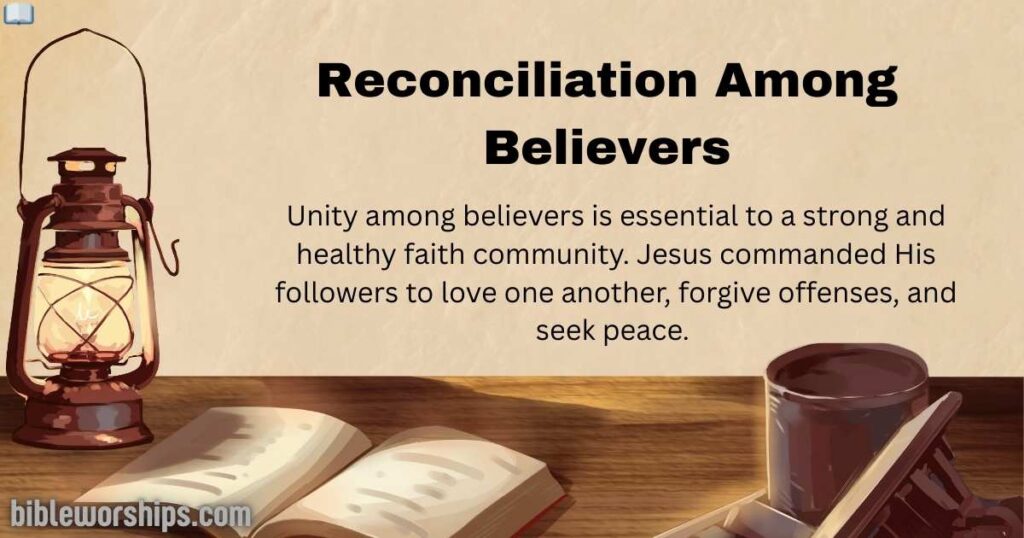
Unity among believers is essential to a strong and healthy faith community. Jesus commanded His followers to love one another, forgive offenses, and seek peace. The church should be a place of harmony, not division. When conflicts arise, believers are called to resolve them with grace and humility. True reconciliation within the body of Christ reflects God’s love and strengthens the faith of the community.
Bible Verses on Reconciliation Among Believers
1. Ephesians 4:32
“Be kind and compassionate to one another, forgiving each other, just as in Christ God forgave you.”
Forgiveness is the foundation of reconciliation. Just as God forgives us through Christ, we are called to extend the same grace to others, showing kindness and compassion.
2. Colossians 3:13
“Bear with each other and forgive one another if any of you has a grievance against someone. Forgive as the Lord forgave you.”
This verse reminds believers that holding grudges damages relationships. Instead, we should practice patience and forgiveness, mirroring God’s mercy.
3. Matthew 18:15
“If your brother or sister sins, go and point out their fault, just between the two of you. If they listen to you, you have won them over.”
Jesus teaches that reconciliation should be handled directly and with love. Private conversations can resolve conflicts before they escalate.
4. Romans 12:18
“If it is possible, as far as it depends on you, live at peace with everyone.”
This verse acknowledges that while reconciliation is ideal, it may not always be within our control. However, believers are called to do their part in fostering peace.
5. James 5:16
“Therefore confess your sins to each other and pray for each other so that you may be healed. The prayer of a righteous person is powerful and effective.”
Confession and prayer strengthen relationships among believers. Openly admitting faults and praying for one another leads to spiritual and emotional healing.
6. Proverbs 17:9
“Whoever would foster love covers over an offense, but whoever repeats the matter separates close friends.”
True reconciliation comes from letting go of past offenses rather than constantly bringing them up. Love promotes healing, while resentment creates division.
7. 1 Peter 4:8
“Above all, love each other deeply because love covers over a multitude of sins.”
Love is at the core of reconciliation. It allows believers to move past offenses and maintain unity in Christ.
8. Galatians 6:1
“Brothers and sisters, if someone is caught in a sin, you who live by the Spirit should restore that person gently. But watch yourselves, or you also may be tempted.”
Correction should always be done in a spirit of gentleness, not condemnation. The goal is to restore, not to shame.
9. Matthew 5:9
“Blessed are the peacemakers, for they will be called children of God.”
Jesus blesses those who actively work toward reconciliation. Promoting peace is a sign of true discipleship.
10. 1 Corinthians 1:10
“I appeal to you, brothers and sisters, in the name of our Lord Jesus Christ, that all of you agree with one another in what you say and that there be no divisions among you, but that you be perfectly united in mind and thought.”
Paul calls believers to unity, urging them to avoid divisions and seek agreement in Christ.
3. The Ministry of Reconciliation
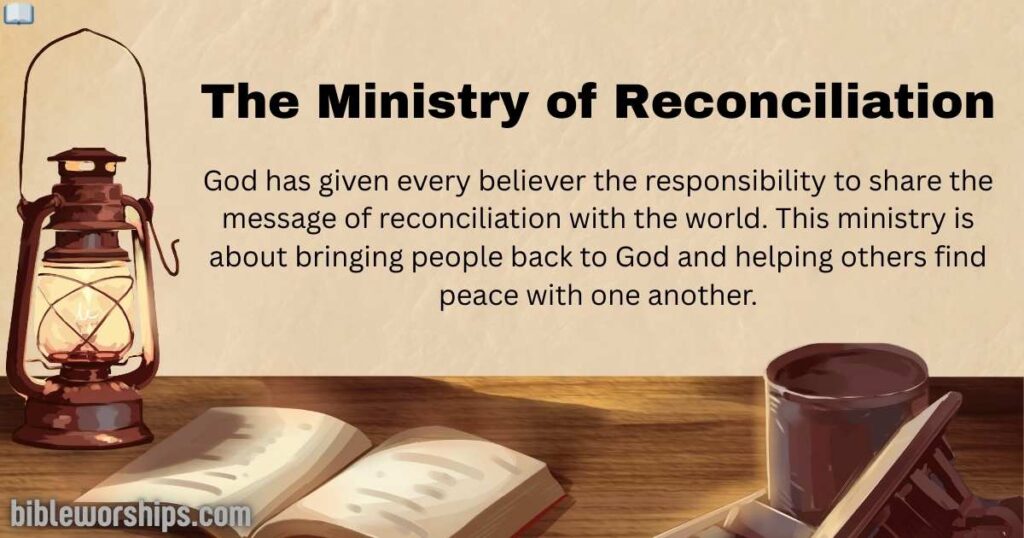
God has given every believer the responsibility to share the message of reconciliation with the world. This ministry is about bringing people back to God and helping others find peace with one another. As ambassadors of Christ, Christians are called to reflect God’s love and lead others toward forgiveness and unity. The Bible teaches that reconciliation is not just a personal experience but a mission for every follower of Christ.
Bible Verses on the Ministry of Reconciliation
1. 2 Corinthians 5:20
“We are therefore Christ’s ambassadors, as though God were making his appeal through us. We implore you on Christ’s behalf: Be reconciled to God.”
As believers, we represent Christ to the world. Our words and actions should reflect His love and call others to be reconciled with God.
2. Matthew 28:19-20
“Therefore go and make disciples of all nations, baptizing them in the name of the Father and of the Son and of the Holy Spirit, and teaching them to obey everything I have commanded you.”
The Great Commission includes reconciliation, as we invite people to enter into a restored relationship with God through faith in Jesus.
3. Romans 10:14-15
“How, then, can they call on the one they have not believed in? And how can they believe in the one of whom they have not heard? And how can they hear without someone preaching to them?”
Sharing the message of reconciliation is vital. If believers do not spread the Gospel, many will remain lost and separated from God.
4. Isaiah 52:7
“How beautiful on the mountains are the feet of those who bring good news, who proclaim peace, who bring good tidings, who proclaim salvation.”
The Gospel is a message of peace and salvation. Those who share it bring joy and hope to those in need of reconciliation.
5. Philemon 1:15-16
“Perhaps the reason he was separated from you for a little while was that you might have him back forever—no longer as a slave, but better than a slave, as a dear brother.”
Paul encourages Philemon to receive Onesimus not just as a former servant but as a beloved brother in Christ. This passage shows the power of the Gospel in transforming relationships.
6. John 20:21
“Again Jesus said, ‘Peace be with you! As the Father has sent me, I am sending you.’”
Jesus commissions His followers to continue His mission, which includes spreading reconciliation and peace.
7. 1 Corinthians 9:22
“To the weak I became weak, to win the weak. I have become all things to all people so that by all possible means I might save some.”
Paul’s approach to ministry highlights the importance of reaching people where they are, demonstrating Christ’s love in a way they can understand.
8. 1 Peter 3:15
“But in your hearts revere Christ as Lord. Always be prepared to give an answer to everyone who asks you to give the reason for the hope that you have.”
Believers must always be ready to explain the message of reconciliation, offering hope to those seeking peace with God.
9. Luke 24:47
“And repentance for the forgiveness of sins will be preached in his name to all nations, beginning at Jerusalem.”
The ministry of reconciliation involves preaching repentance and forgiveness to all people, making salvation accessible to everyone.
10. Titus 3:5
“He saved us, not because of righteous things we had done, but because of his mercy. He saved us through the washing of rebirth and renewal by the Holy Spirit.”
Reconciliation is an act of God’s mercy, not human effort. It is His love that restores us and calls us into His family.
4. Old Testament Foundations of Reconciliation
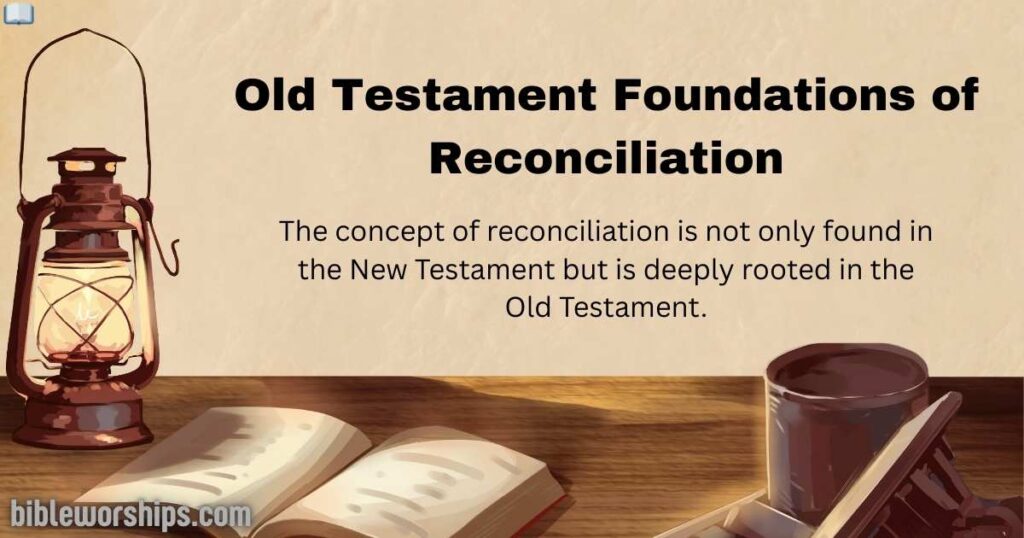
The concept of reconciliation is not only found in the New Testament but is deeply rooted in the Old Testament. From the earliest times, God demonstrated His desire to restore relationships with His people. Through sacrifices, covenants, and acts of mercy, He foreshadowed the ultimate reconciliation through Jesus Christ. Many Old Testament stories and prophecies highlight God’s plan for restoration and peace.
Bible Verses on Reconciliation in the Old Testament
1. Genesis 33:4
“But Esau ran to meet Jacob and embraced him; he threw his arms around his neck and kissed him. And they wept.”
Jacob and Esau’s reconciliation is a powerful example of God’s work in healing broken relationships. Despite past betrayal, their reunion was filled with forgiveness and love.
2. 2 Chronicles 7:14
“If my people, who are called by my name, will humble themselves and pray and seek my face and turn from their wicked ways, then I will hear from heaven, and I will forgive their sin and will heal their land.”
God’s desire for reconciliation extends beyond individuals to entire nations. When people turn to Him in humility, He restores them.
3. Leviticus 16:30
“Because on this day atonement will be made for you, to cleanse you. Then, before the Lord, you will be clean from all your sins.”
The Old Testament sacrificial system foreshadowed Christ’s ultimate sacrifice, showing how God provided a way for His people to be reconciled to Him.
4. Hosea 14:4
“I will heal their waywardness and love them freely, for my anger has turned away from them.”
God’s love is greater than sin. Even when His people turn away, He longs to restore them in His mercy.
5. Isaiah 1:18
“Come now, let us settle the matter, says the Lord. Though your sins are like scarlet, they shall be as white as snow; though they are red as crimson, they shall be like wool.”
God invites His people into reconciliation, offering forgiveness and transformation. His grace washes away all sin.
6. Psalm 51:10
“Create in me a pure heart, O God, and renew a steadfast spirit within me.”
David’s prayer of repentance demonstrates a heart seeking reconciliation with God. True restoration begins with a sincere desire for renewal.
7. Malachi 4:6
“He will turn the hearts of the parents to their children, and the hearts of the children to their parents; or else I will come and strike the land with total destruction.”
Reconciliation extends to families. God desires healing in relationships, restoring unity among loved ones.
8. Job 42:10
“After Job had prayed for his friends, the Lord restored his fortunes and gave him twice as much as he had before.”
Job’s story teaches that reconciliation and forgiveness lead to restoration and blessings.
9. Jeremiah 31:34
“For I will forgive their wickedness and will remember their sins no more.”
God’s promise of forgiveness reveals His ultimate plan for reconciliation through Christ. He removes sins completely, not holding them against us.
10. Micah 7:18
“Who is a God like you, who pardons sin and forgives the transgression of the remnant of his inheritance? You do not stay angry forever but delight to show mercy.”
God delights in mercy, always offering His people a chance to return to Him and be restored.
5. Living a Life of Reconciliation
Reconciliation is not just a one-time event but a way of life. As Christians, we are called to actively seek peace, forgive others, and build relationships that reflect God’s love. This means letting go of grudges, treating others with kindness, and promoting harmony in our daily interactions. Living a life of reconciliation strengthens our relationship with God and helps us demonstrate His grace to the world.
Bible Verses on Living a Life of Reconciliation
1. Romans 12:18
“If it is possible, as far as it depends on you, live at peace with everyone.”
God calls us to be peacemakers. While conflicts may arise, we should always strive for peace and do our part in reconciliation.
2. Colossians 3:13
“Bear with each other and forgive one another if any of you has a grievance against someone. Forgive as the Lord forgave you.”
Just as God forgives us, we should extend that same forgiveness to others, fostering reconciliation and unity.
3. Matthew 5:9
“Blessed are the peacemakers, for they will be called children of God.”
Jesus teaches that those who work for peace reflect God’s nature and are recognized as His true children.
4. Hebrews 12:14
“Make every effort to live in peace with everyone and to be holy; without holiness no one will see the Lord.”
A life of reconciliation requires effort. By pursuing peace, we grow closer to God and reflect His righteousness.
5. Proverbs 16:7
“When the Lord takes pleasure in anyone’s way, he causes their enemies to make peace with them.”
Living righteously brings blessings, including peace with those who may have once been against us.
6. Ephesians 4:1-3
“Be completely humble and gentle; be patient, bearing with one another in love. Make every effort to keep the unity of the Spirit through the bond of peace.”
True reconciliation requires humility, patience, and love. Through the Holy Spirit, believers can maintain unity.
7. Luke 6:27-28
“But to you who are listening I say: Love your enemies, do good to those who hate you, bless those who curse you, pray for those who mistreat you.”
Loving our enemies and responding with kindness is a powerful step toward reconciliation.
8. 1 Thessalonians 5:15
“Make sure that nobody pays back wrong for wrong, but always strive to do what is good for each other and for everyone else.”
Instead of seeking revenge, we should seek reconciliation and promote goodness in all relationships.
9. Psalm 34:14
“Turn from evil and do good; seek peace and pursue it.”
Reconciliation is an active pursuit. It requires turning away from negativity and choosing to do good.
10. James 3:17-18
“But the wisdom that comes from heaven is first of all pure; then peace-loving, considerate, submissive, full of mercy and good fruit, impartial and sincere. Peacemakers who sow in peace reap a harvest of righteousness.”
A life of reconciliation produces righteousness and blessings, both in our lives and in those around us.
6. Forgiveness: The Key to Reconciliation
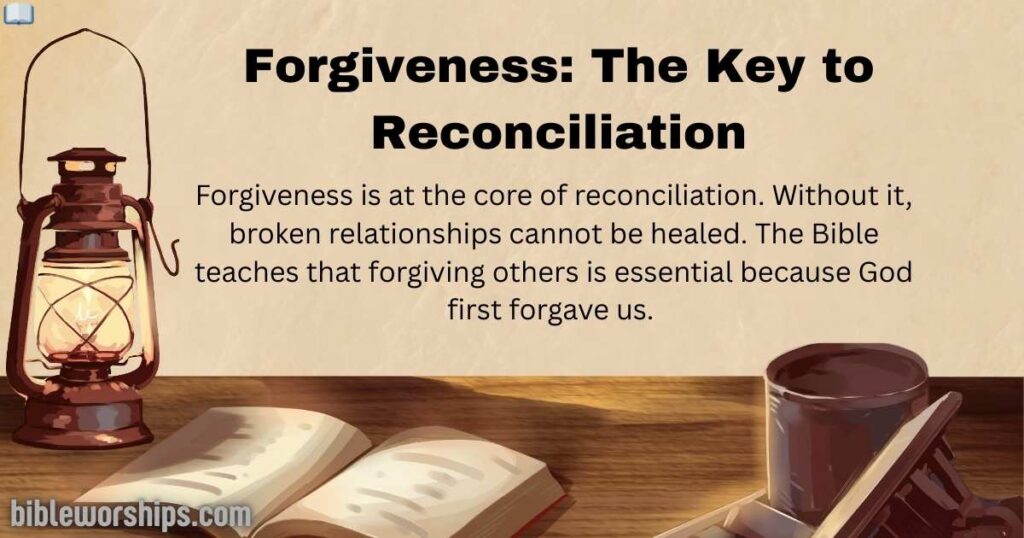
Forgiveness is at the core of reconciliation. Without it, broken relationships cannot be healed. The Bible teaches that forgiving others is essential because God first forgave us. While forgiveness may be difficult, it is necessary for spiritual growth and peace. By forgiving, we free ourselves from bitterness and open the door for restored relationships.
Bible Verses on Forgiveness and Reconciliation
1. Matthew 6:14-15
“For if you forgive other people when they sin against you, your heavenly Father will also forgive you. But if you do not forgive others their sins, your Father will not forgive your sins.”
God expects us to forgive others just as He forgives us. Our willingness to forgive directly impacts our relationship with Him.
2. Ephesians 4:31-32
“Get rid of all bitterness, rage, and anger, brawling and slander, along with every form of malice. Be kind and compassionate to one another, forgiving each other, just as in Christ God forgave you.”
Holding onto anger and bitterness damages relationships. Instead, we should show kindness and forgiveness, just as God does.
3. Colossians 3:12-13
“Therefore, as God’s chosen people, holy and dearly loved, clothe yourselves with compassion, kindness, humility, gentleness and patience. Bear with each other and forgive one another if any of you has a grievance against someone. Forgive as the Lord forgave you.”
Forgiveness requires patience and compassion. We are called to forgive others in the same way God has forgiven us.
4. Luke 17:3-4
“If your brother or sister sins against you, rebuke them; and if they repent, forgive them. Even if they sin against you seven times in a day and seven times come back to you saying ‘I repent,’ you must forgive them.”
Forgiveness is continuous. No matter how many times someone fails, we are called to forgive them when they repent.
5. Mark 11:25
“And when you stand praying, if you hold anything against anyone, forgive them, so that your Father in heaven may forgive you your sins.”
Unforgiveness hinders our prayers. Releasing resentment allows us to experience God’s forgiveness fully.
Conclusion
The Bible teaches that reconciliation is a powerful act of love, forgiveness, and restoration. Whether it is reconciling with God, family, or fellow believers, these verses show that peace and unity are central to Christian living. When we embrace reconciliation, we align ourselves with God’s will and reflect His love in our relationships.
As we reflect on 55 Bible Verses About Reconciliation, may these scriptures inspire us to seek peace, forgive freely, and build bridges where division exists. Through God’s grace, reconciliation can bring healing and transformation to our lives, leading us closer to Him and each other.
FAQ’s
1. What does the Bible say about reconciliation?
The Bible teaches that reconciliation is essential to our faith. It emphasizes making peace with others, forgiving freely, and restoring broken relationships, just as God reconciled us to Himself through Christ (2 Corinthians 5:18-19).
2. Why is forgiveness important in reconciliation?
Forgiveness is the foundation of reconciliation. The Bible teaches that we must forgive others as God forgives us (Colossians 3:13). Without forgiveness, healing and restoration in relationships are impossible.
3. How can I reconcile with someone who has hurt me?
Reconciliation starts with humility, prayer, and a willingness to forgive. The Bible encourages us to seek peace, talk openly, and show love (Matthew 5:23-24). It may take time, but with God’s guidance, restoration is possible.
4. Does God expect us to reconcile with everyone?
While God desires peace, the Bible acknowledges that not all relationships can be restored. Romans 12:18 advises us to live at peace with others “as far as it depends on you,” meaning we should try our best, but reconciliation requires willingness from both sides.
5. How does Jesus’ sacrifice relate to reconciliation?
Jesus’ death on the cross made reconciliation with God possible. Through Him, our sins are forgiven, and we are restored to a right relationship with God (Romans 5:10). His sacrifice also teaches us to seek reconciliation in our own lives.

My name is Razzaq, and I have been writing about Bible verses and prayers for a long time. My deep understanding of these topics allows me to create high-quality content. The information I provide is always 100% accurate, ensuring that readers receive reliable and valuable insights.

